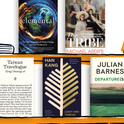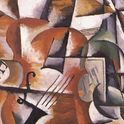Here, in no particular order, are ten books that Prospect writers particularly admired this year.
NON-FICTION1. In the summer Lisa Appignanesi singled out Yu Hua’s “riveting memoir, China in Ten Words (Duckworth Overlook, £16.99)” in which, she wrote, “the celebrated novelist and one-time smalltown dentist presents a wealth of darkly comic anecdotes about everyday life in China over the last 50 years. Each chapter is dedicated to a word, such as ‘people,’ ‘leader,’ ‘revolution’ and ‘bamboozle,’ and into each section he compresses personal and political history, as well as the momentous social change that has transformed his country.”
2. “The Righteous Mind by Jonathan Haidt (Allen Lane, £20) is a truly seminal book,” wrote David Goodhart in April, “out of that remarkable Amerian popular-science-meets-political-speculation stable. Like Steven Pinker, Haidt is a liberal who wants his political tribe to understand humans better. His main insight is simple but powerful: liberals understand only two main moral dimensions, whereas conservatives understand all five.”
3. Undoubtedly the biggest critical success of the past few months has been Iron Curtain: The Crushing of Eastern Europe, 1944-56 by Anne Applebaum (Allen Lane, £25). In our November issue, Oliver Kamm added his voice to this chorus of praise:
“Anne Applebaum describes how the entire region from the Baltic to the Adriatic was subjugated by Stalin within a few years. With a stubborn suspicion of ‘totalitarianism’ as an ideologically tainted term, historians have tended to overlook the extraordinary thoroughness of this phenomenon. Applebaum sets herself to explain it, beginning with Europeans’ sense of ‘radical loneliness’ amid the carnage of the second world war. Her account illuminates the squalid statecraft of the nominally local autocracies of central and eastern Europe. And she describes poignantly the plight of the peoples of these nations, and the psychological compromises needed to live in a system where the communist monopoly on power invaded every aspect of life. This is a magnificent book.”
4. A less garlanded historical masterpiece of 2012 wasOpium: Reality’s Dark Dream, (Yale University Press, £25) by Thomas Dormandy. In April, Rebecca Rose declared Dormandy’s book, “that rare thing: both an extraordinary work of scholarship and a rip-roaring read. In this new book, Dormandy persuades us that the history of opium is so tied up with the history of civilisation that one cannot be told without the other. Not only does Dormandy give us a masterly opium-oriented recap on the major events in history over the past few millennia, but he also spoils us with anecdote-worthy details. In the Roman empire, for example, ‘opium was widely consumed as wine,’ while in the early Christian era it ‘began to appear on coins and ornamental seals.’”
5. On the weirder end of the non-fiction spectrum, in March Amanda Craig praised Geoff Dyer’s Zona (Canongate £16.99), a “discursive, provocative account of how he became haunted by Tarkovsky’s cult classic film, Stalker. Its eclectic ramblings are a must-read for those who love the offbeat. Dyer captures the suggestive strangeness of the film and its power to excite the imagination. At times, he teeters on the edge of becoming as absurdly self-referential as the obsessive narrator of Nabokov’s Pale Fire, but it is rescued by Dyer’s panoptic intelligence, humour, and insight about the way myth and reality have become intertwined following Chernobyl and the collapse of Soviet communism.”
6. In September, Jane Shilling was particularly impressed by William J Dobson’s study of tyranny and protest, The Dictator’s Learning Curve (Harvill Secker, £18.99). “A political journalist based in Washington, Dobson writes with exemplary clarity and a sharp eye for colour. He is particularly good on the animals he finds wandering about on the margins of his stories. Timely, authoritative and as readable as a novel, this is one of the Autumn’s most resonant books—not least because it ends on a note of guarded hope for the future.”
FICTION7. “Flight Behaviour by Barbara Kingsolver (Faber, £18.99) tackles the grim inevitability of climate change with delicacy and insight, and it is particularly illuminating issues of poverty and class,” said Olivia Laing in October. “Climate change is a tricky proposition for a novelist, particularly if she wants—as Kingsolver evidently does—to be accurate without reducing her audience to tearful despair. The result is a master class in fiction’s ability to tell us where we are. I only hope someone thinks to give a copy to the international corpus of climate change deniers, before there’s no world left for the novel to portray.”
8. Ned Beauman’s second novel, The Teleportation Accident (Sceptre, £16.99) was one of this year’s surprise hits, even finding a place on the 2012 Man Booker longlist. Lisa Appignanesi was suitably impressed: “This is the tale of Egon Loeser, a Berlin set-designer of the 1930s, who fails in love and art, manages to be wholly oblivious to politics and sets off first to Paris, then LA, to find the beauty he’s infatuated with, one Adele Hitler. Beauman does adolescent male lust and anomie with the verve of a young Amis and this is a great romp of a novel, delightful in its inventiveness.”
9. “Lightning Rods by Helen DeWitt (And Other Stories, £10) is an angry, mean book,” wrote Richard Beck in his admiring review. “[The book] has the courage to follow its arguments all the way out to their conclusions, even if those conclusions are extreme. Most importantly, it opens up possibilities, both literary and political, that you hadn’t realised were there before.”
10. In a year of London novels—Zadie Smith’s NW and Martin Amis’s Lionel Abso, to name two—John Gray thoughtJohn Lanchester’s novelCapital (Faber, £12.99) did a particularly fine job in capturing the city. Gray praised the portrait that Capital paints—“[it] has a freshness of vision, an emperor-with-no clothes quality, which one associates with expatriate writers. As well as being a luminous rendition of the dislocated life that goes with contemporary capitalism, this is a clairvoyant vision of London at the start of the 21st century.”
Lists! Round-ups! Here!
The top 10 Prospect articles of 2012
The 10 most read Prospect articles of 2012
Sam Leith talks us through 2012 in books, beginning with EL James and ending with Philip Hensher’s lament for the lost art of handwriting. In between there is a feud among sci-fi writers
Click here to read our selections of the best summer reading of the year—with recommendations from John Gray, Rachel Sylvester and Dominic Sandbrook













